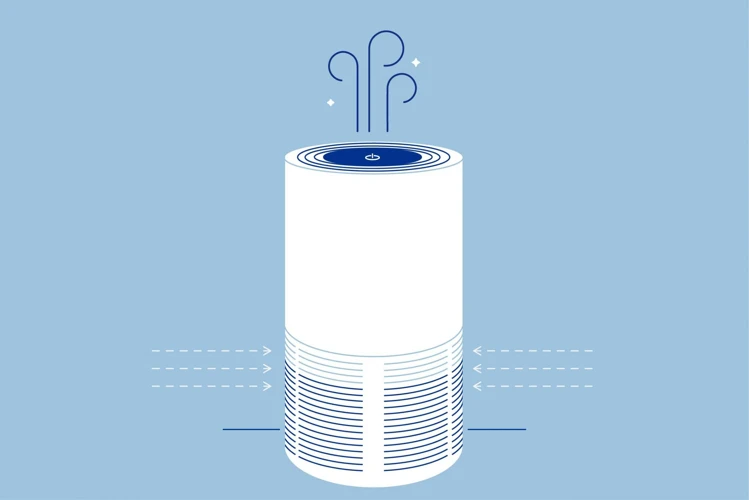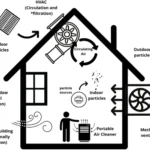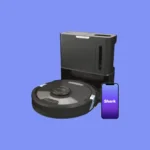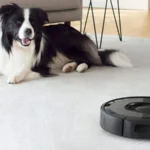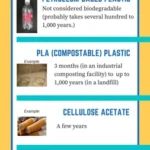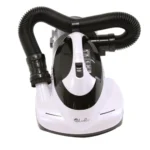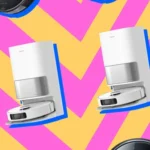As our society becomes more conscious of the impact of human activity on the environment, one area of concern is indoor air quality. Many households have turned to air purifiers or vacuums with HEPA filtration technology to improve the air they breathe. But what is HEPA filtration and why is it considered an eco-friendly feature? In this article, we will delve into the impact of HEPA filtration on the environment, how it improves air quality and reduces the carbon footprint, and the advantages of incorporating HEPA filtration in the latest smart vacuums. Let’s explore this vital topic together.
What is HEPA Filtration?
HEPA filtration refers to a high-efficiency particulate air filtration system that works by trapping and removing small particles that may be present in the air. HEPA filters are designed to capture up to 99.97% of airborne particles, including pet dander, mold spores, pollen, dust mite debris, and other allergens.
HEPA filtration can be used for various purposes, including improving indoor air quality, filtering out harmful pollutants, and reducing the risk of allergies and respiratory problems. Many people use HEPA filters to maintain a healthy environment in their households, workplaces, and public spaces.
One of the advantages of HEPA filtration is that it can remove small airborne particles that are often too small to see with the naked eye. HEPA filters trap these tiny particles by forcing the air through a dense mesh of fibers. When the air passes through the filter, the fibers capture the particles, preventing them from being released back into the air.
HEPA filtration is also efficient in removing harmful pollutants such as tobacco smoke, carbon monoxide, and other toxic chemicals. This makes HEPA filtration an ideal solution to improve indoor air quality and reduce the risk of respiratory illnesses, especially for people with allergies, asthma, or other respiratory conditions.
Compared to other types of filters, HEPA filters have a higher efficiency rate for trapping small particles. Standard filters can only capture particles down to a certain size, whereas HEPA filters can capture smaller particles that are not visible to the naked eye. HEPA filtration is also more effective at preventing the growth of mold and bacteria, as the dense fibers of the filters create a barrier that discourages their growth.
HEPA filtration is an effective and efficient way to improve air quality and reduce the risk of respiratory illnesses. Its popularity has led to the integration of HEPA filters into various household devices, including smart vacuums, air purifiers, and HVAC systems. By using HEPA filtration, individuals can reduce the levels of harmful particles and pollutants in the air around them, leading to a healthier and happier environment.
HEPA filtration can greatly improve the air quality in your home, especially for individuals with allergies or asthma.
The Importance of Sustainable Cleaning
Sustainable cleaning is a significant component when it comes to keeping our environment and our health free from harmful toxins and pollutants. The cleaning industry plays a crucial role in providing clean and safe environments in various settings, including homes, hospitals, schools, and offices. However, many cleaning products and practices might be hazardous, both to people and to the environment.
The use of eco-friendly products and cleaning techniques is becoming increasingly popular. Eco-friendly products are made with natural ingredients that are biodegradable and chemically safe. They are also packaged in recyclable materials, which reduces waste and minimizes the impact on the environment. Using such cleaning products can help to protect the environment by reducing the amount of VOCs (volatile organic compounds) that are dispersed into the atmosphere.
Using a vacuum cleaner with a HEPA filter is another important aspect of sustainable cleaning. HEPA filters capture over 99% of tiny airborne particles that would otherwise circulate in the air and become potential health hazards. Standard filtration systems are not as efficient and can result in a significant amount of pollutants and allergens being re-circulated in the room.
Incorporating HEPA filtration technology into cleaning practices has many benefits for the environment and human health. By removing pollutants and allergens from the air, HEPA filtration can help reduce respiratory irritations, allergies, and other health problems caused by poor indoor air quality. Additionally, HEPA filtration can lengthen the lifespan of HVAC systems by preventing the circulation of harmful particles throughout the system.
HEPA filters are reusable, which makes them a cost-effective and eco-friendly solution for improving indoor air quality. However, it is important to properly maintain HEPA filters to ensure they continue to work effectively. Regular filter maintenance and replacement are necessary to prevent reduced airflow and ensure optimal performance.
Sustainable cleaning practices, such as using eco-friendly products and incorporating HEPA filtration, have a positive impact on the environment and human health. By reducing the amount of harmful chemicals and pollutants released into the air, we can create a healthier and safer living environment.
To learn more about HEPA filtration and smart vacuum cleaners, check out our benefits of smart HEPA vacuum page and our smart vacuum HEPA filter maintenance guide.
HEPA Filtration and Air Quality
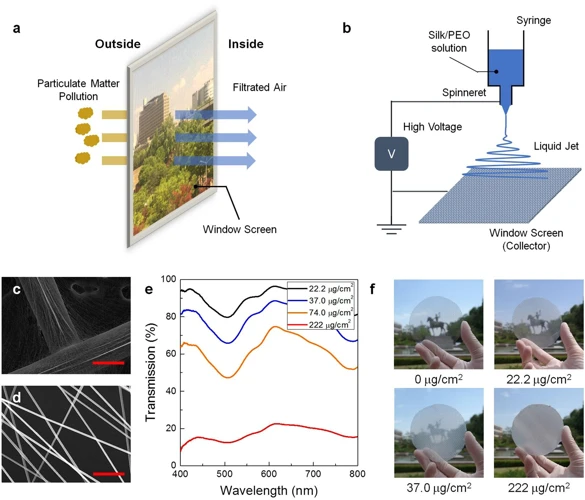
HEPA filtration is widely recognized as an important factor for improving indoor air quality. HEPA stands for High-Efficiency Particulate Air, and these filters are designed to capture and trap small particles that can harm our respiratory health. HEPA filters are highly effective because they can capture incredibly small particles like pollen, dust mites, and pet dander which are often responsible for allergies and other respiratory problems.
How HEPA Filtration Improves Air Quality
HEPA filtration works by forcing air through a fine mesh that traps harmful particles. This technology can capture up to 99.97% of particles as small as 0.3 microns. This includes things like mold, bacteria, and viruses, which would otherwise circulate through the air and contribute to respiratory illnesses.
HEPA Filter Efficiency in Capturing Airborne Particles
HEPA filters are the most efficient filters available to consumers today. They can capture much smaller particles than ordinary filters, which often do not capture anything smaller than 10 microns. This means that they are highly effective in trapping harmful particles that can easily slip past other filters.
Comparison to Average Filters
The difference between HEPA filters and average filters is significant. HEPA filters are able to capture particles that are many times smaller than what an average filter can capture. HEPA filters also have a higher particle capture rating, which means that they can capture much more in terms of the percentage of particles that pass through the filter.
Benefits for People with Allergies and Respiratory Problems
For people with allergies, asthma, and other respiratory problems, HEPA filtration can make all the difference. By filtering out the particles that cause allergic reactions and respiratory issues, HEPA filters can significantly improve indoor air quality and reduce symptoms like sneezing, coughing, and congestion.
Using HEPA filtration is an effective way to improve air quality and promote respiratory health. If you’re interested in learning more about the benefits of using HEPA filters or debunking HEPA filter myths, check out our article on HEPA Filtration Myths Debunked. If you’re looking for a smart vacuum with HEPA filtration, check out our article on HEPA Filtration in Smart Vacuums, which discusses the advantages of using a smart vacuum with HEPA filtration for pet owners and those with allergies.
How HEPA Filtration Improves Air Quality
HEPA filtration is highly effective in improving air quality by removing airborne pollutants that are harmful to health. These pollutants include dust, mold spores, pet dander, pollen, and other small particles that can be harmful to people with respiratory problems or allergies.
Using a HEPA filter in a vacuum cleaner can help eliminate these airborne particles and prevent them from recirculating in the air. In traditional vacuum cleaners, the vacuum motor often blows small particles back into the room, which can lead to poor air quality. Meanwhile, vacuums with HEPA filters capture up to 99.97% of particles that are as small as 0.3 microns in size, preventing them from escaping back into the air.
This type of filtration helps to remove harmful contaminants from the air, making it cleaner and healthier to breathe. Additionally, HEPA filters can capture many types of bacteria and viruses that can cause sickness, making them highly effective in preventing the spread of disease.
Compared to traditional filters, HEPA filters have a much greater capacity for removing harmful particles from the air. Standard filters can remove only about 80-90% of particles that are 1 micron in size, while HEPA filters trap particles as small as 0.3 microns. This level of filtration makes HEPA filters ideal for those who want to reduce indoor air pollution levels to ensure a healthy indoor environment.
If you suffer from allergies or respiratory issues, HEPA filtration can provide significant relief. HEPA filters are highly effective in capturing pet dander, dust mites, and other allergens that can trigger allergy symptoms. This is particularly important for pet owners, as pet dander can be especially difficult to remove from carpets and upholstery. By using a smart vacuum with a HEPA filter, you can effectively remove pet hair and dander while ensuring clean indoor air.
HEPA filtration is a highly effective method for improving air quality indoors. By using a HEPA filter in your vacuum cleaner, you can effectively remove harmful particles from the air while protecting your health. If you interested in learning about how HEPA filtration compares to standard filters, smart vacuums with HEPA filters or how it benefits people with allergies, respiratory problems or pet owners, you can follow links that lead to more detailed information.
HEPA Filter Efficiency in Capturing Airborne Particles
HEPA (High-Efficiency Particulate Air) filters are designed to capture and trap small particles in the air, making them an extremely effective tool in improving indoor air quality. They work by using a dense mat of fibres that are arranged in a random pattern, which creates a complex network of small openings that the air must pass through. Because the openings are so small, HEPA filters can trap particles as small as 0.3 microns – much smaller than the human eye can see.
HEPA filters have a high efficiency rate in capturing airborne particles. In fact, they can capture up to 99.97% of particles that are 0.3 microns in diameter or larger. This includes common airborne allergens like pet dander, pollen, and dust mites, as well as particles from household chemicals and cleaning products. This is significant because these tiny particles can trigger allergies and respiratory problems, and can be especially harmful to people with weakened immune systems.
In comparison, standard air filters have a much lower efficiency rate. They typically capture particles that are 10 microns or larger, which means that they allow smaller particles to pass through. This is why HEPA filters are recommended for people with allergies or respiratory problems, as they provide a higher level of protection.
Using a HEPA filter in your home or workplace can significantly improve air quality, and can make a big difference for people with allergies or respiratory problems. By capturing small particles that would otherwise be inhaled, HEPA filters can help reduce allergies and allergic reactions, as well as decrease the amount of pollutants in the air. This is particularly important in areas with high levels of pollution or in homes where people are sensitive to allergens.
HEPA filtration is also an important feature to consider when choosing a smart vacuum. Smart vacuums equipped with HEPA filters can capture and trap small particles, like pet hair and dander, that would otherwise remain in your carpets and air. This is especially important for pet owners and people with allergies, who may benefit from the additional filtration provided by a HEPA filter.
HEPA filters are highly efficient in capturing airborne particles. They provide a higher level of protection than standard air filters, which makes them an important consideration for people with allergies or respiratory problems. Smart vacuums with HEPA filters can improve indoor air quality, making them a smart choice for pet owners and allergy sufferers. To learn more about the differences between HEPA filtration and standard filtration, check out our article on /hepa-filtration-vs-standard-filtration/
Comparison to Average Filters
HEPA filters are far superior to the average filters found in most vacuum cleaners and air purifiers. The average filter can capture particles as small as 10 microns, but HEPA filters can capture particles as small as 0.3 microns with an efficiency rate of 99.97%. This means that HEPA filters capture almost all harmful particles in the air, including pollen, dust mites, pet dander, and even cigarette smoke.
Using average filters may seem like a cheaper alternative, but it’s important to consider the long-term impact. Without the use of HEPA filters, harmful particles can circulate back into the air and exacerbate respiratory problems or allergies. In contrast, HEPA filtration provides a significant improvement in air quality, making it a worthwhile investment.
Because HEPA filters are more efficient at capturing smaller particles, they need to be replaced less frequently than average filters. On average, they last between 2-5 years, while average filters may need replacing every few months. This decreased need for filter replacement leads to less waste and an overall reduced carbon footprint.
Choosing a vacuum or air purifier with HEPA filters is a smart investment that has both immediate and long-term benefits. By providing superior air filtration, it creates a healthier environment for allergy and asthma sufferers, pet owners, and those who prioritize eco-friendly practices. To learn more about the benefits of HEPA filtration in smart vacuums, check out our article on smart vacuum HEPA filters. Those with specific concerns regarding allergens or pet hair may also benefit from our articles on HEPA filtration and smart vacuums for allergies or HEPA filtration and smart vacuums for pet owners.
Benefits for People with Allergies and Respiratory Problems
For people who suffer from allergies and respiratory problems, HEPA filtration can provide immense relief. Traditional filters are not effective in capturing small airborne particles such as pollen, dust mites, and pet dander, which can trigger allergies and asthma.
HEPA filters, on the other hand, capture up to 99.97% of airborne particles as small as 0.3 microns. This means that they can effectively capture smoke, pollen, and other small particles that can aggravate respiratory problems.
HEPA filters are also efficient in capturing bacteria and viruses that can cause infections. This is because such particles are often carried on larger particles and can be captured by HEPA filters before they can spread infection.
Using HEPA filters in air purifiers, vacuums, and HVAC systems can drastically improve indoor air quality for people with allergies and respiratory problems.
Additionally, the use of HEPA filters can reduce the reliance on harmful chemicals and fragrances that can also irritate respiratory systems. By removing harmful particles from the air, HEPA filtration can create a healthier living environment for individuals with allergies and respiratory problems.
It is important to note that HEPA filtration alone is not a complete solution for allergy and respiratory problems. Professional medical advice should be sought as well as proper cleaning practices including flushing out the HVAC system regularly and dusting.
The Eco-Friendliness of HEPA Filtration
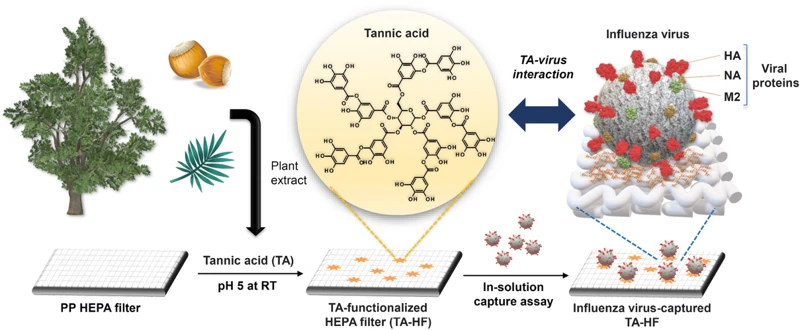
HEPA filtration not only benefits our health but also the environment. By opting for a HEPA filter, you’re not just improving the air quality in your home, but you’re also reducing your carbon footprint.
Reduced Carbon Footprint
The production of HEPA filters requires less energy compared to their conventional counterparts. By consuming less energy, less carbon is released into the atmosphere, contributing to a smaller carbon footprint. Additionally, HEPA filters have a longer lifespan than regular filters, which means fewer filter replacements and less waste.
The Importance of Proper Disposal of HEPA Filters
It’s important to note that even though HEPA filters are better for the environment, they still require proper disposal. HEPA filters are made up of a mixture of materials including plastic, metal, and glass fibers. These materials make it difficult to recycle, and improper disposal can harm the environment. It’s important to read the manufacturer’s guidelines for disposal or check with your local recycling facility for instructions.
Sustainability in Cleaning Practices
Using a HEPA filter is just one part of a sustainable cleaning practice. It’s important to consider the entire process, from the type of cleaning solution used to the way waste is disposed of. By using eco-friendly cleaning solutions and proper waste disposal methods, you can reduce your impact on the environment. Additionally, using a vacuum cleaner with a HEPA filter can further contribute to sustainable cleaning practices.
The eco-friendliness of HEPA filtration cannot be ignored. By reducing our carbon footprint and properly disposing of filters, we can make a positive impact on the environment. Incorporating sustainable cleaning practices, including the use of HEPA filters, is a small step towards a cleaner and healthier planet.
Reduced Carbon Footprint
HEPA filtration is an eco-friendly feature that has several advantages, one of which is a reduced carbon footprint. The term “carbon footprint” refers to the amount of carbon dioxide and other greenhouse gases emitted by an individual, organization, or product. HEPA filters help to reduce carbon emissions by improving air quality and reducing the need for energy-intensive air conditioning.
Increase in Air Quality
HEPA filtration removes airborne particles such as dust, pollen, and pet dander from the air. This reduction in airborne particles leads to improved air quality, which means that people are less likely to suffer from allergies, asthma, or other respiratory illnesses. When air quality is improved, the demand for air conditioning is reduced, which in turn leads to a reduction in carbon emissions.
Energy Efficiency
HEPA filters themselves do not use energy, but the cleaning devices that they are installed in do. However, the energy used by vacuums and air purifiers equipped with HEPA filters is significantly lower than that used by devices without this feature. This lower energy consumption results in lower carbon emissions and reduced energy costs.
Longer Filter Life
HEPA filters have a longer lifespan compared to traditional filters. They are more durable, and they do not require frequent replacement. This means that less waste is produced, which results in a reduced carbon footprint. The reduced frequency of replacement also helps to save money and resources.
Sustainable Cleaning
HEPA filtration is a sustainable cleaning practice. By using HEPA filters, the amount of waste generated is significantly reduced. HEPA filters also capture microscopic pollutants, including those associated with volatile organic compounds (VOCs), which are released from cleaning products. This reduces the amount of harmful chemicals released into the environment.
Improvement in Public Health
HEPA filtration helps to improve public health by reducing the amount of air pollution. Cleaner air means that people are less likely to suffer from respiratory illnesses, such as asthma and allergies. This, in turn, leads to a reduction in the number of hospital admissions and emergency room visits, resulting in lower healthcare costs.
HEPA filtration is an eco-friendly feature that has several benefits, one of which is a reduced carbon footprint. HEPA filters contribute to a sustainable cleaning practice, improve air quality, and reduce energy consumption, resulting in lower carbon emissions and reduced energy costs. Their long lifespan and improved air quality also reduce the amount of waste generated and improve public health.
The Importance of Proper Disposal of HEPA Filters
Proper disposal of HEPA filters is crucial to maintain the eco-friendliness of this technology. HEPA filters are designed to capture and hold onto harmful particles, such as dust, pollen, and bacteria. However, when these filters have reached the end of their life, they need to be disposed of appropriately. Simply throwing them in the trash can lead to these captured particles being released back into the environment.
Recycling is one option for proper disposal of HEPA filters. While HEPA filters cannot be recycled through a typical municipal recycling program, there are companies that specialize in recycling these filters. These companies may take the filters apart, separating the metal and plastic components for reuse, and incinerating the filter media, which can be used as fuel.
Landfills should be avoided as a disposal option for HEPA filters. Because of the contaminants they contain, HEPA filters should not be sent to landfill sites. They should be properly incinerated or recycled to avoid potentially harmful effects on the environment.
Professional Disposal is often recommended for used HEPA filters. Many companies that specialize in the installation and maintenance of HEPA filters may also offer disposal services. This ensures that the filters are disposed of appropriately, without releasing harmful particles back into the environment.
In addition to proper disposal, it is important to regularly replace HEPA filters to maintain their effectiveness. Over time, the filter media can become clogged with captured particles, reducing the filter’s efficiency. Replacement frequency will depend on the amount of use and the environment in which the filter is being used.
The importance of proper disposal of HEPA filters cannot be overstated. Recycling and professional disposal are recommended methods for disposing of these filters. It is imperative to properly discard used HEPA filters to avoid the release of captured particles into the environment. Regular replacement of filters also ensures their optimal efficiency and effectiveness in maintaining clean air quality.
Sustainability in Cleaning Practices
It is important to consider the impact our daily practices have on the environment, and that includes cleaning practices. With HEPA filtration, not only are we improving indoor air quality but we are also contributing to sustainability in cleaning practices.
Traditional cleaning methods often relied heavily on harsh chemicals and disposable cleaning supplies. These products would end up in landfills, contributing to pollution and harming the environment. In contrast, using HEPA filtration reduces the need for harsh chemicals, as it effectively captures dust, mold spores, and other airborne particles.
With HEPA filtration, a vacuum’s cleaning efficiency is maximized, reducing the need for multiple rounds of cleaning. This effectively cuts down the amount of time and money required to keep a space clean. As a result, fewer natural resources are consumed, and the overall carbon footprint of cleaning practices is reduced.
Sustainability also means considering the end of a product’s lifecycle. This is where proper disposal of HEPA filters comes into play. Rather than simply tossing them into the trash, which can harm the environment, it is important to recycle or dispose of them properly. Many manufacturers offer take-back programs that allow customers to send in used filters for proper disposal or recycling.
Incorporating HEPA filtration into cleaning practices not only improves indoor air quality but also contributes to a sustainable future. By using fewer natural resources and reducing waste, we are helping to preserve the environment for future generations.
Advantages of HEPA Filtration in Smart Vacuums
Smart vacuums with HEPA filtration technology offer numerous advantages over conventional vacuums. Here are some of the key benefits of HEPA filtration in smart vacuums:
Effective Cleaning Performance: Smart vacuums with HEPA filters can remove fine particles and contaminants effectively, leaving your home or office much cleaner and healthier. HEPA filters capture up to 99.97% of airborne particles as small as 0.3 microns, which is significantly smaller than what average filters can capture.
Time and Cost Savings: Smart vacuums with HEPA filtration technology save both time and money. They can readjust the level of suction based on the type of flooring in your home or office, which ensures that you’ll get maximum cleaning performance and efficient battery usage. Also, smart vacuums with HEPA filters need less frequent replacements than traditional vacuum filters, which can save money in the long run.
Hygienic Dirt Disposal: Smart vacuums with HEPA filtration technology offer hygienic dirt disposal. They come with a dirt disposal tray that can be easily removed and emptied, which reduces the risk of allergens being released into the air when compared to traditional vacuums that release dust and allergens into the air when the bag is changed.
HEPA filtration in smart vacuums is transforming the way we clean our homes and offices. With their effective cleaning performance, time and cost savings, and hygienic dirt disposal, HEPA filtration vacuums provide a healthier and more convenient cleaning solution. Adopting these eco-friendly smart vacuums will not only help to reduce your carbon footprint but will also help keep your home and office safe and healthy.
Effective Cleaning Performance
HEPA filtration has become an important aspect of sustainable cleaning, particularly in smart vacuums. The incorporation of HEPA filters in these cleaning devices has brought about many benefits, including effective cleaning performance.
The use of HEPA filtration in smart vacuums ensures that dust, dirt, and other pollutants are effectively captured and contained within the vacuum, leaving surfaces clean and free of debris. The filters capture 99.97% of particles as small as 0.3 microns, making them highly effective in removing allergens and other harmful contaminants from the air.
One of the advantages of HEPA filtration in smart vacuums is the ability to clean a wider range of surfaces compared to traditional vacuums. This is due to the efficient cleaning power of HEPA filters, which are designed to capture and hold particles in the filter rather than recirculating them back into the air like regular vacuums.
The larger surface area of HEPA filters in smart vacuums also contributes to their effective cleaning performance. The filters can trap larger volumes of dust and other pollutants before clogging, thereby ensuring optimal cleaning performance all the time. Additionally, smart vacuums with HEPA filtration tend to have less suction loss over time as compared to traditional vacuums, which is a huge plus for users.
The use of HEPA filtration in smart vacuums translates to faster and more effective cleaning performance, ensuring that surfaces are left clean and free of pollutants. This contributes to a healthier living environment for all.
Time and Cost Savings
When it comes to smart vacuums, one of the most significant advantages of HEPA filtration is the time and cost savings it provides to users. By using a vacuum that incorporates HEPA filtration technology, users can benefit from more efficient cleaning processes that ultimately reduce the time and energy required for cleaning. This is because HEPA filters are designed to capture even the smallest and most stubborn particles, such as pet hair, pollen, and dust mites, meaning you can clean your space in less time with fewer strokes of the vacuum.
HEPA filtration can also save you money in the long run. While you may pay a little more upfront for a vacuum cleaner with a HEPA filter, this will help to reduce the cost of replacement filters over time. Ordinary filters need to be replaced regularly since they can quickly become clogged with dirt and debris. In contrast, HEPA filters can last much longer, generally up to two years, even with routine cleaning. Having fewer filter replacements means less expenditure on replacement filters over the life span of your vacuum.
By implementing HEPA filtration in your cleaning routine, not only will you save time and money, but you’ll also enjoy cleaner indoor air quality in your home, which is a significant advantage for people with allergies and respiratory issues. Because a HEPA filter captures airborne particles as small as 0.3 microns, you’re less likely to breathe in harmful contaminants. This means less need for expensive and time-consuming cleaning products, air purifiers, and trips to the doctor.
Incorporating HEPA filtration into your cleaning routine is the smart choice for those looking to save time and money. With more efficient cleaning, longer-lasting filters, and improved air quality, investing in a vacuum cleaner with HEPA technology is a wise choice that benefits both you and the environment in the long run.
Hygienic Dirt Disposal
One of the most impressive features of HEPA filter-enabled smart vacuums is their hygienic dirt disposal mechanism. Unlike traditional vacuums that often require users to come into direct contact with dirt and debris, HEPA filter-equipped vacuums use advanced technology to ensure that dirt is disposed of effectively and cleanly, without ever requiring the user to touch it.
These smart vacuums typically include a designated dirt bin or compartment that is designed to be easily emptied without creating a mess. Some models even use specialized bags or containers that can be easily removed and disposed of, limiting the amount of time users spend handling or cleaning up after their vacuums.
Another major advantage of HEPA filter vacuums in terms of hygienic dirt disposal is their ability to reduce the risk of allergen and bacteria exposure. Because HEPA filters capture microscopic particles that other filters might miss, they make for a much more thorough and effective cleaning process overall. This is especially important for people who suffer from allergies or asthma, as it helps to remove potential triggers from the environment.
The hygienic dirt disposal feature of HEPA filter-enabled smart vacuums is one of their key selling points, offering users a cleaner, more convenient way to keep their living spaces free of dirt and other contaminants. By prioritizing sustainable, eco-friendly cleaning practices like these, we can do our part to protect the planet and promote healthy living for everyone.
Conclusion
Summing Up the Benefits of HEPA Filtration
HEPA filtration is an innovative and eco-friendly cleaning feature that is gaining popularity in the world of vacuum cleaners. Its ability to capture and trap airborne particles even as small as 0.3 microns makes it an outstanding cleaning tool.
One of the most significant advantages of HEPA filtration is its impact on air quality. By capturing pollutants and allergens, it significantly improves the air quality in homes, making them safer and healthier for all occupants. This feature is particularly helpful for individuals with allergies or respiratory problems.
In addition to this, HEPA filters are also eco-friendly. They have a reduced carbon footprint, making them more sustainable than other filter options. However, proper disposal of HEPA filters is crucial to prevent them from releasing pollutants and contaminating the environment.
Another advantage of HEPA filtration is its efficacy in smart vacuums. By using HEPA filtration, these vacuums can effectively clean surfaces, saving time, money, and reducing cleaning efforts, particularly in larger homes.
The Future Implications of HEPA Filtration
As more people become aware of the importance of sustainable cleaning, the demand for HEPA filtration is increasing. In the future, it is expected that more innovations aimed at improving HEPA filtration will be developed. This could lead to the creation of more affordable and efficient vacuum cleaner models. Moreover, there is potential for broader applications of HEPA filtration technology beyond vacuum cleaners, such as air purifiers and HVAC systems.
In conclusion, the impact of HEPA filtration on air quality, sustainability, and cleaning efficiency cannot be overstated. Due to its numerous benefits, this innovative technology is set to become an integral part of eco-friendly cleaning practices.
Summary of HEPA Filtration Benefits
HEPA filtration is a crucial aspect of sustainable cleaning that has numerous benefits for both individuals and the environment. By capturing nearly all airborne particles and pollutants, HEPA filters improve air quality, making it suitable for those with allergies or respiratory issues. Additionally, HEPA filters are an eco-friendly option that reduces carbon footprint.
HEPA filtration is not limited to the air-cleaning industry, as it has made its way into various cleaning devices, such as smart vacuums. Smart vacuums equipped with HEPA filters are more efficient in cleaning dirt and debris while simultaneously reducing the spread of allergens and pollutants.
HEPA filter technology also provides time and cost savings, as it reduces the need to replace filters frequently. The filters can be washed and reused for an extended period, facilitating sustainable cleaning practices.
The use of HEPA filters in cleaning practices benefits not only individuals’ health but also the planet. As more people become aware of their impact on the environment, implementing eco-friendly solutions such as HEPA filtration will become essential in creating a sustainable future.
The Future Implications of HEPA Filtration
As we move towards a more sustainable future, the role of HEPA filtration in promoting healthier indoor air quality cannot be overstated. With growing concern about the impact of pollution and climate change on our health, HEPA filtration is a step in the right direction towards a cleaner environment.
One of the future implications of HEPA filtration is its widespread adoption in households and public spaces. As more people become aware of the benefits of clean indoor air quality, HEPA filters will continue to gain popularity. HEPA filtration technology will likely become mainstream, leading to increased demand for eco-friendly products and services that prioritize sustainable cleaning practices.
Another implication is the continuous improvement of HEPA filter technology. With advancements in nanotechnology and engineering, future HEPA filters will be even more efficient in capturing ultrafine particles. This means better air quality and less exposure to harmful pollutants that can trigger allergies and respiratory problems.
HEPA filtration technology is also likely to become a key component in the development of smart homes and buildings. Integration of HEPA filters with HVAC systems will provide cleaner air in homes and public spaces, enhancing the overall health and well-being of occupants. Smart home technology will also allow for more efficient and automated cleaning practices, reducing energy consumption and carbon footprint.
Finally, the future of HEPA filtration lies in its potential to impact the environment on a larger scale. Improved air quality translates to longer life expectancy and reduced healthcare costs. By promoting sustainable cleaning practices, HEPA filtration can contribute to reducing the carbon footprint and building a greener future.
As we move forward, HEPA filtration will continue to play a critical role in ensuring better air quality and promoting eco-friendly cleaning practices. With advancements in technology and increasing awareness about the benefits of sustainable living, HEPA filtration is poised to become an integral part of our daily lives.
Frequently Asked Questions
1. How does HEPA filtration improve air quality?
HEPA filters are designed to capture microscopic particles, including pollen, dust mites, and pet dander, which can all negatively affect air quality. By removing these particles from the air, HEPA filtration improves the overall quality of indoor air.
2. What is the difference between HEPA filters and average filters?
HEPA filters are designed to capture 99.97% of particles that are 0.3 microns or larger, while average filters only capture a smaller percentage of larger particles. This makes HEPA filters significantly more effective at improving air quality than average filters.
3. Can HEPA filtration help people with allergies and respiratory problems?
Yes. HEPA filtration can remove many of the allergens that cause allergies, such as pollen, dust mites, and pet dander, from the air. It can also help to remove irritants that can trigger asthma attacks, such as smoke and air pollution.
4. How does HEPA filtration reduce carbon footprint?
HEPA filtration can reduce the carbon footprint by reducing the need for energy-intensive air conditioning systems. By removing particles from the air, HEPA filtration can help to maintain a comfortable indoor temperature without the need for excessive use of air conditioning.
5. What is the importance of sustainable cleaning practices?
Sustainable cleaning practices help to reduce the environmental impact of cleaning by using products and methods that are less harmful to the environment. This can include using eco-friendly cleaning products and reducing waste by using reusable cleaning supplies
6. How should HEPA filters be disposed of properly?
HEPA filters should be disposed of in accordance with local waste disposal regulations. In general, they should be handled as hazardous waste due to the potential for them containing harmful materials. Some manufacturers offer take-back programs for used filters.
7. Can HEPA filtration be used with smart vacuums?
Yes. HEPA filtration is commonly used in smart vacuums to improve air quality while cleaning. By capturing microscopic particles, HEPA filters can prevent them from being released back into the air during the vacuuming process.
8. How does hygienic dirt disposal work with smart vacuums?
Smart vacuums often use a compartmentalized system for dirt disposal, which allows for easier and more hygienic disposal of the collected dirt and debris. Some models even feature self-cleaning systems that automatically dispose of collected dirt and debris.
9. What are the economic benefits of using HEPA filtration?
Using HEPA filtration can lead to long-term cost savings due to the reduced need for energy-intensive air conditioning and heating systems. HEPA filters themselves are also durable and long-lasting, meaning they don’t need to be replaced as frequently as average filters.
10. What is the future of HEPA filtration?
The future of HEPA filtration is likely to involve increased integration with smart home systems and the use of advanced materials that improve filter efficiency and durability. This could improve the overall effectiveness and sustainability of HEPA filtration technology.
